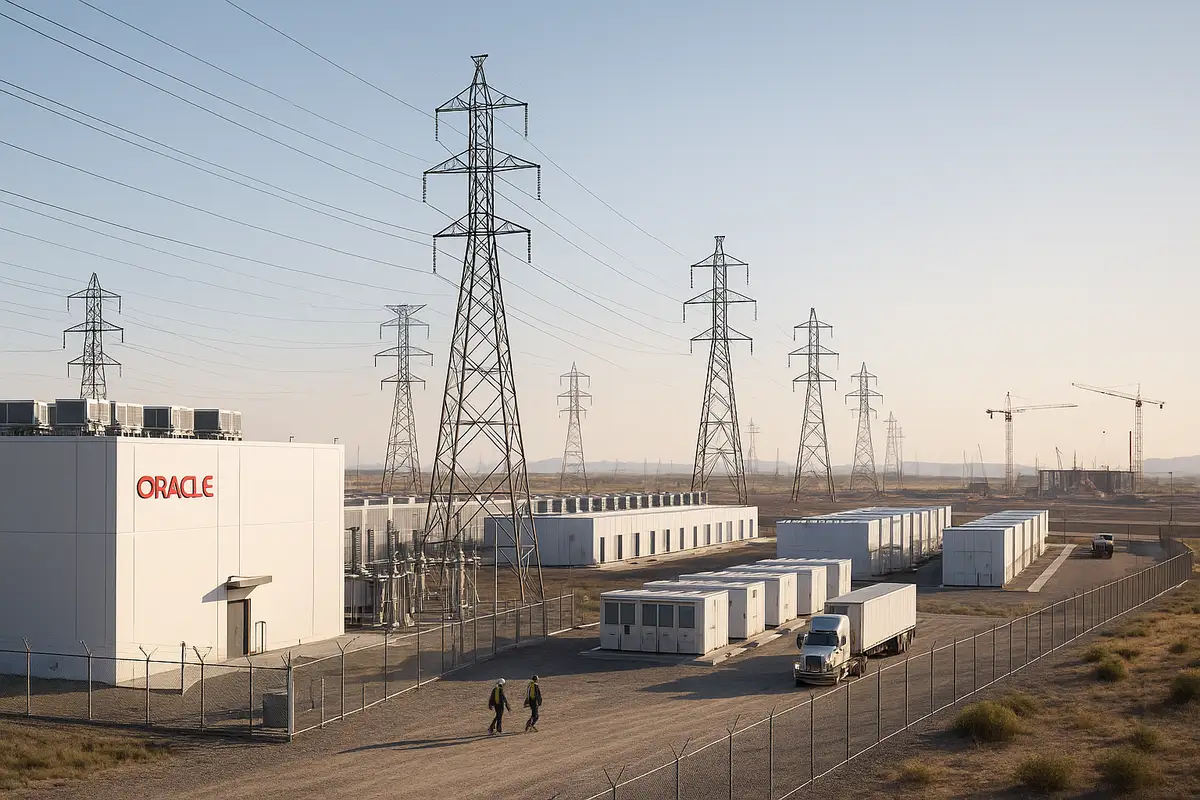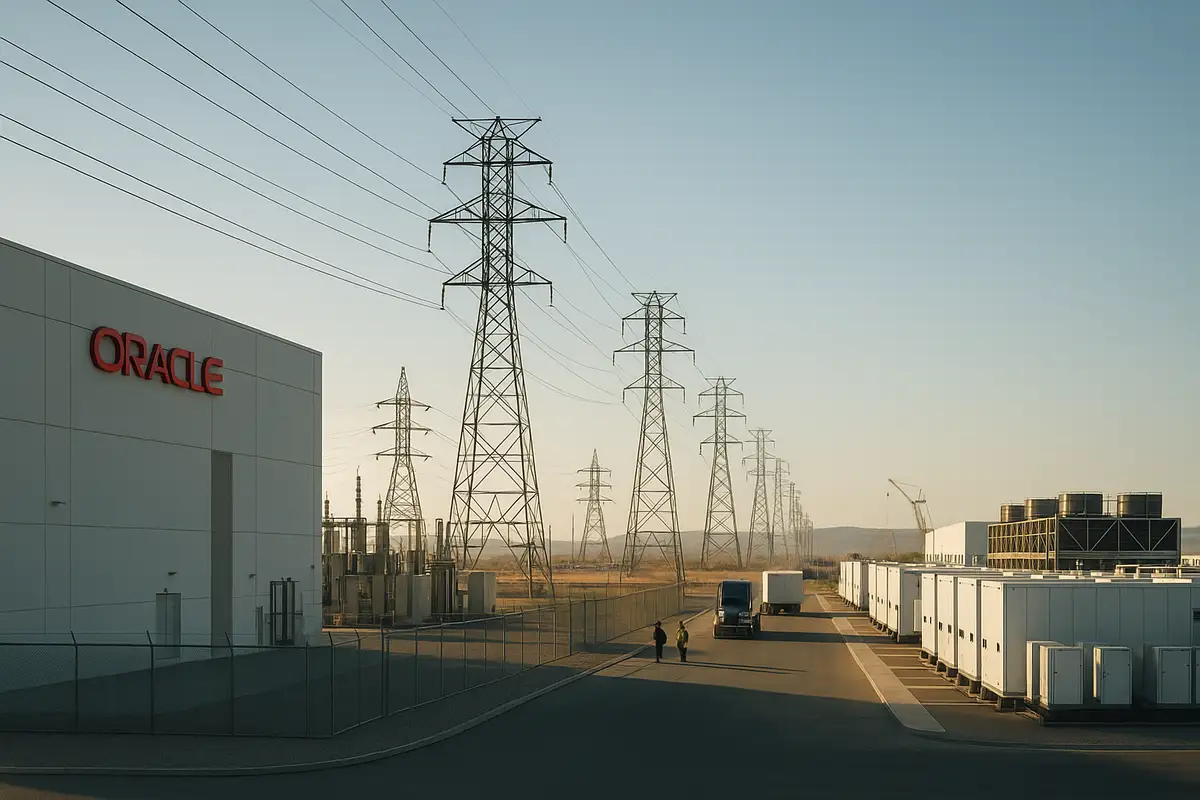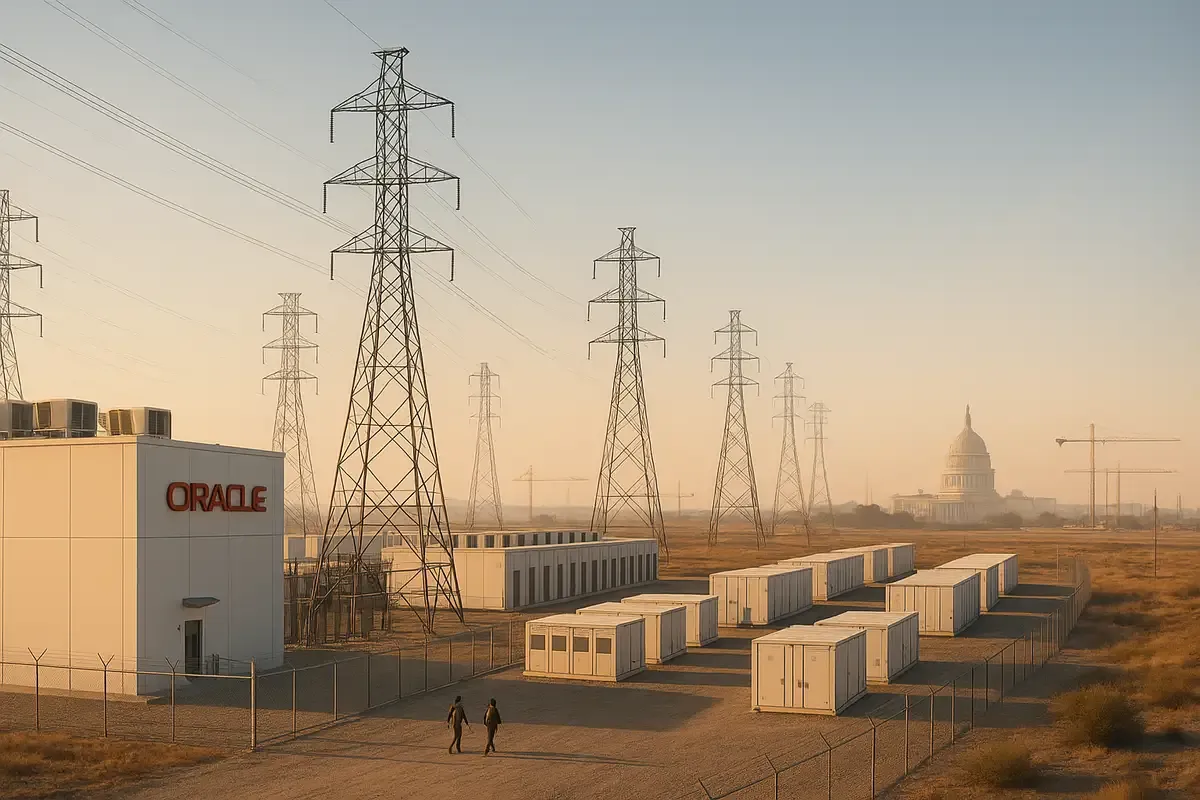Good Morning from San Francisco,
Oracle just inked a $300 billion computing deal with OpenAI. That's not a typo. The five-year contract dwarfs most national budgets and requires power equivalent to two Hoover Dams.
Meanwhile, Senator Cruz wants to hand AI companies a regulatory get-out-of-jail-free card. His SANDBOX Act gives automatic approval if agencies don't respond within 90 days. Consumer groups aren't thrilled about "experimenting on Americans."
Both moves signal the same thing: AI's infrastructure wars are heating up. Computing capacity determines winners. Regulatory speed matters more than safety theater.
The question isn't whether this reshapes everything. It's how fast.
Stay curious,
Marcus Schuler
Oracle signs $300 billion OpenAI computing deal

OpenAI committed to buy $300 billion in computing power from Oracle over five years, starting in 2027—among the largest cloud contracts ever signed.
The deal requires 4.5 gigawatts of power capacity, equivalent to two Hoover Dams' output. Oracle's stock jumped 43% after revealing $317 billion in new contract revenue, with most tied to this OpenAI commitment. The surge added $100 billion to Larry Ellison's wealth in one day.
The financial gap is stark: OpenAI generates roughly $10 billion annually but commits to average yearly payments of $60 billion. Oracle faces its own constraints with a debt-to-equity ratio of 427%, far above Microsoft's 33%.
The arrangement transforms Oracle from an "overflow" cloud provider into a core AI infrastructure partner, assuming OpenAI's growth continues and Oracle can execute massive data center construction across five states.
Why this matters:
• Computing capacity increasingly determines AI competitive advantage, making infrastructure deals strategic weapons rather than utility purchases
• The scale tests whether AI business models can support the $2.9 trillion global data center buildout planned through 2028

AI Image of the Day

Prompt:
A soft-focus portrait in the style of Alphonse Mucha
depicts a Caucasian model with long, flowing auburn hair, her expression conveying a subtle, wistful smile while gently holding a lit cigarette. She is adorned in a flowing, semi-sheer nightgown of emerald green, the deep neckline accentuating her graceful silhouette as she stands poised against a dramatic, swirling oceanic backdrop of sapphire blues and stormy grays. The scene is bathed in a warm, golden light emanating from behind, creating a halo effect and highlighting the delicate imperfections of her skin, enhancing the dreamlike ambiance, while a single, antique silver locket rests delicately upon her chest. Wisps of sea mist dance in the air, adding to the ethereal quality of the composition.
Cruz bill gives AI companies regulatory escape hatch

Republican Senator Ted Cruz introduced the SANDBOX Act Wednesday, allowing AI companies to seek two-year waivers from federal regulations, renewable up to a decade.
If agencies don't respond within 90 days, waivers get automatically approved. The White House Office of Science and Technology Policy can override agency denials.
The bill sidesteps state regulation preemption—the provision that killed Cruz's 10-year moratorium attempt in a 99-1 Senate vote in July. Consumer groups call it "experimenting on Americans." Tech industry group NetChoice endorsed the approach.
Cruz frames the policy as essential for beating China in AI development, echoing Trump administration priorities. Delaware already runs its own AI sandbox, but Senator Lisa Blunt Rochester questioned whether OSTP represents "the appropriate place" for federal oversight.
The override mechanism creates tension between White House political appointees and career regulators with domain expertise.
Why this matters:
• Federal AI policy increasingly reflects geopolitical competition frames, potentially prioritizing speed over safety considerations
• The OSTP override mechanism creates precedent for political appointees reversing technical agency determinations across regulatory domains

🧰 AI Toolbox
How to Create Professional Designs with Natural Language

Mew.Design transforms your words into polished visuals using AI "Meow Designers." Skip Adobe. Ditch Figma. Just describe what you want and get editable designs with perfect text rendering.
Tutorial:
- Go to the Mew.Design website
- Sign up for your free account and credits
- Type your design idea in plain English (like "Instagram post for coffee shop sale")
- Choose your preferred "Meow Designer" style specialist
- Generate multiple unique design variations instantly
- Edit text and elements directly in the final design
- Export professional graphics that actually look professional
URL: https://mew.design/
AI & Tech News
Charlie Kirk shot dead at Utah Valley University event
Conservative activist Charlie Kirk was shot and killed Wednesday while speaking at Utah Valley University, with the gunshot fired from a building 200 yards away during his "American Comeback Tour" event. Videos of the shooting immediately went viral across X, Instagram, YouTube and Telegram, accumulating millions of views as platforms struggled to remove the graphic content showing Kirk's fatal neck wound.
Tech firms bet $344 billion on single AI approach
The world's four largest tech companies will spend $344 billion this year on AI infrastructure, with most funds going to large language models like ChatGPT despite growing evidence of diminishing returns and reliability problems. Critics including Palantir's CEO and Meta's chief AI scientist warn that Silicon Valley's fixation on one technique risks missing breakthrough approaches, as startups like DeepSeek and Covariant explore fundamentally different paths to machine intelligence.
AI adoption drops at large US companies for first time
AI adoption at large US companies fell from 14% to 12% between June and September, marking the biggest decline since the Census Bureau began tracking corporate usage in 2023. The drop follows an MIT study showing most corporate AI pilots failed to produce material benefits, suggesting companies may view AI tools as trendy additions rather than essential business infrastructure.
AI companies steal 15.8 million YouTube videos for training
AI companies downloaded more than 15.8 million YouTube videos from 2 million channels without permission to train video-generation tools, violating the platform's terms of service while YouTube took no action to stop the mass extraction. The systematic harvesting by Microsoft, Meta, Amazon and other tech firms creates AI products that directly compete with the human creators whose work was stolen to build them.
US dollars fund spyware firms despite government crackdown
US investors poured money into spyware companies throughout 2024, including a fresh injection into sanctioned firm Saito Tech and a potential $900 million deal backed by firefighter pension funds. The flow of American capital into surveillance technology that US policymakers actively combat creates a parallel economy that undermines Washington's own export controls and sanctions regime.
Microsoft releases Visual Studio 2026 after five-year gap
Microsoft released Visual Studio 2026 preview this week, marking the first major version update since November 2021 with deeper AI integration and design changes that the company acknowledges are "incremental rather than revolutionary." The five-year development cycle signals Microsoft's shift toward maintaining Visual Studio as a specialized tool while VS Code captures the broader developer market, with VS 2026 still running on legacy .NET Framework despite supporting modern .NET 10 applications.
Apple launches iPhone Air at record 5.6mm thickness
Apple announced the iPhone Air Tuesday, measuring just 5.6mm thick and 36% thinner than the iPhone 17 Pro, though it sacrifices battery life and camera quality for its ultra-slim profile. The company deliberately created a "hard choice" between the fashion-focused Air and performance-oriented Pro models, betting consumers will pay premium prices for style over specs.
YouTube expands AI dubbing feature to all creators after pilot success
YouTube launched its multi-language audio feature for all creators Wednesday after a two-year pilot that included MrBeast and Jamie Oliver, using Google's Gemini AI to replicate creator voices and emotions across different languages. The rollout comes as pilot users averaged over 25% of their watch time from non-primary language views, with Oliver's channel tripling its audience after adding dubbed tracks.
Klarna stock jumps 15% after raising $1.37 billion IPO
Klarna shares closed at $45.82 Wednesday after pricing above range at $40, giving the Swedish fintech a $17 billion valuation despite falling from its $45.6 billion pandemic peak in 2021. The oversubscribed offering pushes 2025 IPO proceeds to $25.7 billion, surpassing last year's pace as companies like Circle and Figma also surge in debuts that suggest investor appetite for new listings has returned.
NATO picks Oracle Cloud for critical military systems
NATO's Communications and Information Agency will move its mission-critical workloads to Oracle Cloud Infrastructure, working with contractors Thales and Reply Group companies to migrate three legacy data centers. The decision shows how defense organizations now trust commercial cloud providers with sensitive military systems, choosing Oracle's sovereign cloud capabilities over building their own infrastructure.
🚀 AI Profiles: The Companies Defining Tomorrow

KOI
Koi builds a checkpoint between employees and the software they install. The cybersecurity startup wants to give security teams control without killing productivity.
The Founders
• Founded 2024 by three Unit 8200 alumni: CEO Amit Assaraf, CTO Idan Dardikman, CPO Itay Kruk
• Split between Tel Aviv R&D and Washington D.C. go-to-market
• Started after they hacked VSCode's extension marketplace in 30 minutes, proved enterprise blind spots exist
• Hit $1M ARR within months, now protects 500K+ endpoints
The Product
• "Supply Chain Gateway" that discovers every package, plugin, extension employees install
• Scores risk using AI engine called Wings, blocks dangerous stuff before installation
• Covers browsers, IDEs, containers, packages, even AI models
• Gives security teams veto power while preserving employee choice
• Works as prevention layer, not just alert-after-damage
The Competition
• Browser security: Island, LayerX focus on browser-only risks
• Package security: Endor Labs, Socket, Phylum specialize in open-source dependencies
• Traditional EDR: CrowdStrike, Microsoft detect after execution, not before installation
• Koi's edge: treats app stores as attack surface, covers multiple software surfaces with one policy engine
Financing
• $48M raised total: $10M seed, $38M Series A
• Led by Battery Ventures, Team8, Picture Capital, NFX
• No disclosed valuation
• Investors active in security and developer tooling
The Future ⭐⭐⭐⭐
Software supply chains keep expanding as teams install AI tools and dev helpers daily. Koi has capital, momentum, and a story security leaders repeat. The winner needs to block bad installs fast while staying invisible to productive workers.









